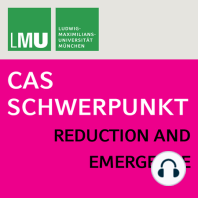44 min listen

Collective Accuracy: Agent Based & Emergent vs Statistical and Assumed
FromCenter for Advanced Studies (CAS) Research Focus Reduction and Emergence (LMU)
Collective Accuracy: Agent Based & Emergent vs Statistical and Assumed
FromCenter for Advanced Studies (CAS) Research Focus Reduction and Emergence (LMU)
ratings:
Length:
82 minutes
Released:
Dec 11, 2014
Format:
Podcast episode
Description
In the past two decades, agent-based models (ABMs) have become ubiquitous in philosophy and various sciences. ABMs have been applied, for example, to study the evolution of norms and language, to understand migration patterns of past civilizations, to investigate how population levels change in ecosystems over time, and more. In contrast with classical economic models or population-level models in biology, ABMs are praised for their lack of assumptions and their flexibility. Nonetheless, many of the methodological and epistemological questions raised by ABMs have yet to be fully articulated and answered. For example, there are unresolved debates about how to test (or "validate") ABMs, about the scope of their applicability in philosophy and the sciences, and about their implications or our understanding of reduction, emergence, and complexity in the sciences. This conference brings together an interdisciplinary group of researchers aimed at understanding the foundations of agent-based modeling and how the practice can inform and be informed by philosophy. | Center for Advanced Studies & Munich Center for Mathematical Philosophy: 11.12.2014 | Speaker: Scott Page
Released:
Dec 11, 2014
Format:
Podcast episode
Titles in the series (25)
Reduction and Emergence in Physics: Research Focus Reduction and Emergence by Center for Advanced Studies (CAS) Research Focus Reduction and Emergence (LMU)